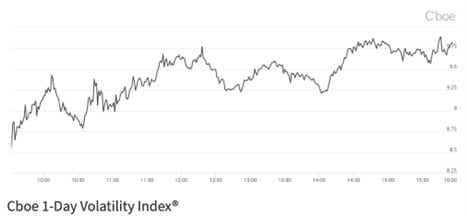What is the VIX1D & How Does it Work?

What is the VIX1D & How Does it Work?
What is the VIX 1D?
The VIX1D, or the 1-Day Volatility Index, measures expected volatility in the S&P 500 Index for the current trading day.
The Chicago Board Options Exchange (Cboe) launched the product on April 24, 30 years after the original VIX Index, which is a similar and well-known instrument among traders.
While non-tradeable, the index has already attracted considerable attention in the trading community, meeting a long-awaited need in financial markets. That said, it is important to understand and monitor the index, especially for short-term traders.
How Does the 1-Day VIX Work?
The 1-Day Volatility Index was developed by Cboe Labs—the company’s integrated innovation hub. The new index aims to complement the original VIX, tracking expected volatility over the current day in the S&P 500 instead of over the next month. This index is relevant to all investors but will likely be most heavily utilized by those employing short-term trades.
Taking an aggregated measurement of weighted prices across one- and zero-day P.M. settled SPX option expirations, the VIX1D calculates its value of expected volatility, according to the Cboe’s press release. Simply put, the VIX1D reflects the midpoint values of weekly SPX put and call prices for today and the next day in real-time. The full methodology can be found here.
Cboe 1-Day Volatility Index – First Day of Trading (April 24)

Image Source: cboe.com
Why is the VIX1D important for 0DTE options?
The new volatility index comes after zero-day options exploded in popularity with traders during the Coronavirus pandemic. Zero days to expiration (0DTE) options are contracts that expire at the end of the same day they are purchased. Those options offer traders a more tactical approach concerning short-term strategies.
The original VIX Index—launched 30 years ago this month—isn’t of much use to traders who operate on short time frames, especially for those trading zero-day options. Naturally, the index should experience higher volatility than the VIX Index because it tracks shorter-dated options. That should better inform traders of shifting market conditions.
And although many trading zero-day options prefer to trade pure directional risk, the index should offer cues as to when it is more prudent to hedge trades or to stay out of the market altogether. The Cboe hopes this product will fill the gap and help better inform traders of intraday volatility conditions.
While some regulators have denounced the rise of popularity in short-term trading and zero-day options, the Cboe’s new tool merely provides investors and traders another point of data to base their trading decisions; regulators or otherwise, it is hard to argue against a better-informed market.
Is the VIX 1D the same as the VIX?
No. Whereas the Volatility Index (VIX) measures implied volatility for a 30-day ahead period, the VIX1D measures implied volatility for the current trading day
VIX 1D key takeaways
- Cboe’s 1-Day Volatility Index launched on the 30-day anniversary of the original VIX
- The new index offers a valuable tool to zero-day options traders
- Unlike the VIX Index, the VIX1D is not a tradeable product
Options involve risk and are not suitable for all investors. Please read Characteristics and Risks of Standardized Options before deciding to invest in options.